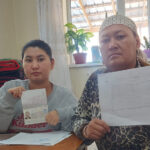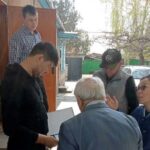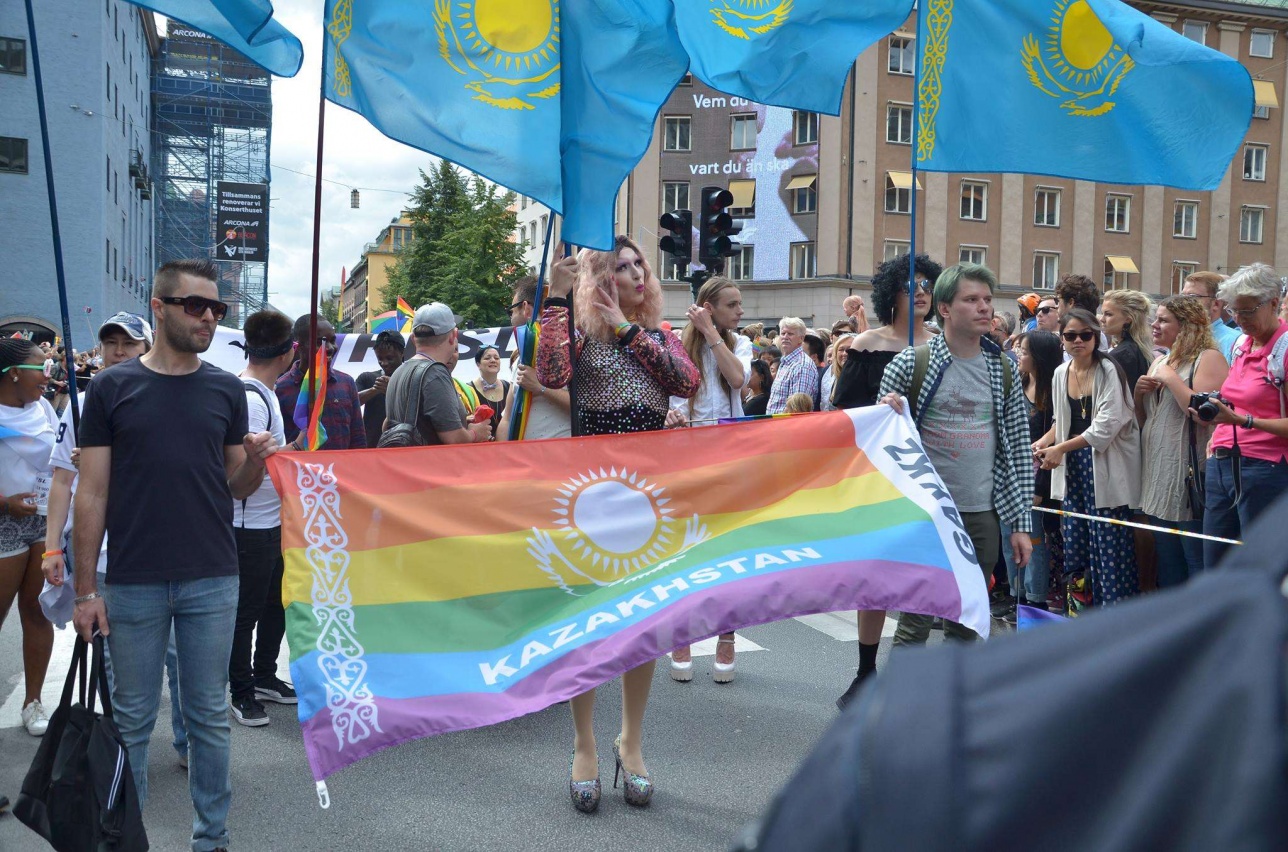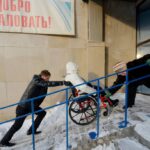FAILURE TO PROTECT AGAINST RETURN TO TORTURE OR OTHER ILL-TREATMENT
COLLABORATION AND COLLUSION BETWEEN AUTHORITIES IN CIS COUNTRIES
On 9 December 2012 Abdusamat Fazletdinov, a 19-year old labour migrant committed suicide in a pre-trial detention facility in Moscow, terrified that he would be extradited to Uzbekistan where officers of the National Security Service (NSS) had threatened to torture him for example by pulling out his finger nails, to make him confess to belonging to and financing a banned Islamist group. His mother denied he had links to any banned organizations.
Savriddin Dzhurayev was accused by the Tajikistani authorities of involvement in banned Islamist organizations. He fled to Russia in 2006, and in 2009 was arrested in Moscow after an extradition request from the Tajikistani authorities, on the grounds that, in 1992, Savriddin, then aged seven, had: “used the outbreak of civil war and resulting chaos in the republic to destabilize the political situation in the Republic of Tajikistan and illegally appropriating the official authority of law enforcement officers.” Savriddin Dzhurayev applied to the European Court of Human Rights and in 2010 the Court requested the Russian authorities not to extradite him pending its examination of the case. He was released in 2011 but soon after this he was abducted in Moscow and put on a plane to Tajikistan. After torture at the hands of Tajikistani officials and an unfair trial, last year Savriddin Dzhurayev was sentenced to 26 years. He maintains his innocence. In May 2013, The European Court ruled that the Russian Federation had violated Savriddin Dzhurayev’s right to freedom from torture and other ill-treatment by allowing his abduction and return to Tajikistan.
Uzbekistani national Azamatzhon Ermakov fled to Russia in March 2009. Later that year he was arrested in Nizhnii Novgorod following an extradition request from the Uzbekistani authorities on charges of involvement in extremist religious groups, incitement to religious and other hatred, and attempting to overthrow the constitutional order. In December 2009, Azamatzhon Ermakov applied for asylum; his application was rejected. On 22 September 2010, the European Court of Human rights issued an order to stay his extradition until his complaint was substantively considered by the Court. In the meantime Azamatzhon Ermakov was sentenced to one year and four months’ imprisonment accused of illegal possession of weapons and ammunitions. He maintains that the police planted one grenade on him. In January 2013 the Russian authorities informed Amnesty International that Azamatzhon Ermakov had left for Tashkent on 2 November 2012. There is strong circumstantial evidence to indicate that he was abducted following his release from detention and put on a plane to Uzbekistan. In May 2013 Azamazhon Ermakov’s lawyers received confirmation that he is being detained in a pre-trial detention facility in Uzbekistan.
In October 2012 Leonid Razvozzhayev, a Russian citizen and aide to Russian opposition MP Ilya Ponomaryov , was abducted in Kyiv and returned to Russia apparently by Russian state security agents operating in Ukraine. Leonid Razvozzhayev had been put on the federal wanted list in the Russian Federation in connection with a criminal case against him and other opposition politicians. A spokesman of the Ministry of Internal Affairs of Ukraine confirmed that Leonid Razvozzhayev had been abducted “by law enforcement officers or law enforcement officers of another state”.
Ruslan Suleymanov, an Uzbekistani citizen, moved to Ukraine in November 2010 fearing that he would be subjected to an unfair trial and to torture. He had been a manager in a private construction company in Uzbekistan that was targeted for takeover by rival business interests. He was detained when he went to the Ministry of Interior in Chernihiv, northern Ukraine on 25 February 2011 to apply for a work permit. Ruslan Suleymanov applied for asylum in Ukraine but his application was rejected. UNHCR recognized him as a refugee but despite this he was extradited to Uzbekistan to stand trial for alleged economic crimes. According to his family he was still being held in detention in Tashkent in March 2013.
In June 2011 Kazakhstan extradited 28 ethnic Uzbek men to Uzbekistan where they were at real risk of torture. In May of that year the UN Committee against Torture had reaffirmed its 2010 interim measures, prohibiting Kazakhstan from extraditing these individuals. Relatives reported the men were kept in poor conditions of detention and subjected beatings and other ill-treatment by the security forces. The men had originally fled Uzbekistan, fearing that they would be persecuted due to their religious beliefs or affiliations with banned or unregistered Islamist organizations. They were detained in June 2010, at the request of the Uzbekistan government. In June 2012 the UN Committee against Torture concluded “that the State party’s extradition of the complainants to Uzbekistan was in breach of article 3 of the Convention [against torture].”
TORTURE AND OTHER ILL-TREATMENT IN COUNTRIES OF CENTRAL ASIA
Kazakhstan
Zhasulan Suleimenov, a paraplegic, had gone to Russia to receive medical treatment. In 2009 he was detained by the Russian security services, reportedly at the request of their Kazakhstani colleagues, and extradited to Kazakhstan. He was convicted in November 2009 on charges of terrorism and sentenced to eight years in prison after what independent observers called a “blatantly unfair trial”. He alleged in court that he had been tortured by National Security Service officers in order to force him to confess. Zhasulan Suleimenov, was kept in solitary confinement in Kazakhstan for more than 11 months. Despite being transferred several times between prisons, including to a prison hospital, he was denied access to necessary medical care and has not received an independent and impartial medical examination.
Kyrgyzstan
Usmanzhan Khalmirzaev, an ethnic Uzbek Russian citizen, died on 9 August 2011, reportedly as a result of torture, two days after he was arbitrarily detained and taken to a local police station in Bazar-Korgan. He told his wife that a gas mask was put over his face and he was beaten. The police threatened that if he did not pay them US$ 6,000, they would charge him with violent crimes in relation to the June 2010 violence. He was eventually released after his family gave the officers US$ 680 but died two days later. Following a request from the Russian consulate, the prosecutor of Jalal-Abad opened a criminal case in August 2011 against four police officers with several charges, including torture. Before the trial began, relatives of the accused threatened key witnesses for the prosecution, the family and Usmanzhan Khalmirzaev’s lawyer. As a result, some witnesses left the country. On 26 December 2012 Jalal-Abad Regional Court indefinitely postponed the trial after three of the defence lawyers failed to show at the scheduled hearing.
Tajikistan
Muhammad Akhadov was arrested in Russia in 2007 and held in detention until extradited to Tajikistan the following year on charges of breaking and entering, drugs possession and obstruction of justice. In 2010 Muhammad Akhadov complained to the Russian General Prosecutor that upon arrival in Dushanbe he was taken to the Ministry of Internal Affairs where: “[T]hey beat and abused me. Late at night […] two officials stripped me naked, tied up my hands and legs… While one of them… raped me, the other recorded the terrible process on camera.” Security officers threatened him that unless he confessed in writing to the crimes they would circulate the photos of his rape throughout Tajikistan. Muhammad Akhadov was sentenced to nine years in prison.
Turkmenistan
According to the authorities, opposition supporters carried out an assassination attempt on then-President Saparmurad Niyazov in November 2002 in the capital Ashgabat. Dozens of people were subjected to enforced disappearance. At least 59 people were convicted in unfair trials between December 2002 and January 2003, including Boris Shikhmuradov, Foreign Minister from 1995 until 2000, who was sentenced to 25 years’ imprisonment in a closed trial on 29 December 2002. The People’s Council (Khalk Maslakhaty) reportedly increased his sentence to life imprisonment the next day. Reportedly, many of those accused of involvement in the alleged assassination attempt were tortured and put under psychological pressure to confess and incriminate others. Boris Shikhmuradov’s televised ‘confession’ was broadcast on 29 December 2002 and there were reports that the text of the confession was dictated to him.
Despite repeated requests for information, Boris Shikhmuradov’s family have still received no news about his current whereabouts.
Uzbekistan
Dilorom Abdukadirova fled Uzbekistan after attending the Andizhan demonstration in May 2005, leaving her husband and children behind. She returned to Uzbekistan in January 2010 after receiving assurances from the authorities that nothing would happen to her. However, she was detained and tried on charges of attempting to overthrow the constitutional order as well as of illegally exiting and entering Uzbekistan in relation to her participation in the 2005 Andizhan unrest. She was sentenced to 10 years and two months’ imprisonment in 30 April 2010 in an unfair trial. Family members reported that she appeared emaciated at the trial, had bruises on her face and avoided eye contact with members of her family. Dilorom Abdukadirova’s sentence was extended by further eight years for alleged bad behaviour.
You can download the report in PDF format HERE
http://www.amnesty.org/en/library/asset/EUR04/003/2013/en/d77dc110-54e4-4d76-abd0-4ad28eb240c1/eur040032013en.html

















